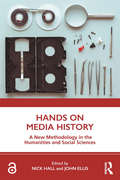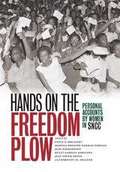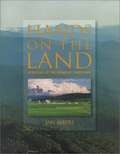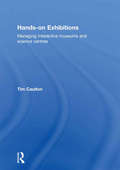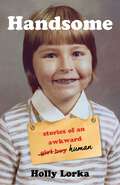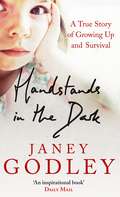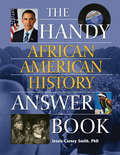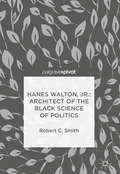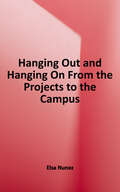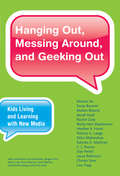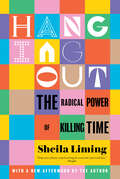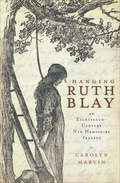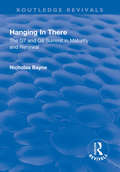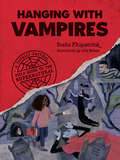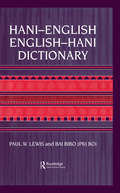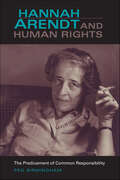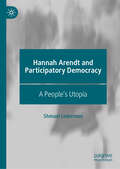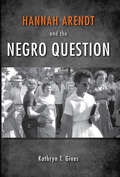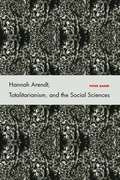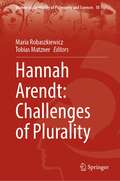- Table View
- List View
Hands on Media History: A new methodology in the humanities and social sciences
by Nick Hall;John EllisHands on Media History explores the whole range of hands on media history techniques for the first time, offering both practical guides and general perspectives. It covers both analogue and digital media; film, television, video, gaming, photography and recorded sound. Understanding media means understanding the technologies involved. The hands on history approach can open our minds to new perceptions of how media technologies work and how we work with them. Essays in this collection explore the difficult questions of reconstruction and historical memory, and the issues of equipment degradation and loss. Hands on Media History is concerned with both the professional and the amateur, the producers and the users, providing a new perspective on one of the modern era’s most urgent questions: what is the relationship between people and the technologies they use every day? Engaging and enlightening, this collection is a key reference for students and scholars of media studies, digital humanities, and for those interested in models of museum and research practice.
Hands on the Freedom Plow: Personal Accounts by Women in SNCC
by Betty Garman Robinson Martha Prescod Norman Noonan Dorothy M. Zellner Faith S. Holsaert Jean Smith Young Judy RichardsonIn Hands on the Freedom Plow, fifty-two women--northern and southern, young and old, urban and rural, black, white, and Latina--share their courageous personal stories of working for the Student Nonviolent Coordinating Committee (SNCC) on the front lines of the Civil Rights Movement. The testimonies gathered here present a sweeping personal history of SNCC: early sit-ins, voter registration campaigns, and freedom rides; the 1963 March on Washington, the Mississippi Freedom Summer, and the movements in Alabama and Maryland; and Black Power and antiwar activism. Since the women spent time in the Deep South, many also describe risking their lives through beatings and arrests and witnessing unspeakable violence. These intense stories depict women, many very young, dealing with extreme fear and finding the remarkable strength to survive. The women in SNCC acquired new skills, experienced personal growth, sustained one another, and even had fun in the midst of serious struggle. Readers are privy to their analyses of the Movement, its tactics, strategies, and underlying philosophies. The contributors revisit central debates of the struggle including the role of nonviolence and self-defense, the role of white people in a black-led movement, and the role of women within the Movement and the society at large. Each story reveals how the struggle for social change was formed, supported, and maintained by the women who kept their "hands on the freedom plow." As the editors write in the introduction, "Though the voices are different, they all tell the same story--of women bursting out of constraints, leaving school, leaving their hometowns, meeting new people, talking into the night, laughing, going to jail, being afraid, teaching in Freedom Schools, working in the field, dancing at the Elks Hall, working the WATS line to relay horror story after horror story, telling the press, telling the story, telling the word. And making a difference in this world."
Hands on the Land: A History of the Vermont Landscape
by Jan AlbersWinner of the annual Fred B. Kniffen Book Award presented by the Pioneer America Society (PAS). This award is given to the best new book published about the North American cultural landscape. Winner of a Vermont Book Professionals Association Milestone Award 2000, Winner of the National Arbor Day Foundation's 2001 Media Award and Winner of SPNEA's Book Prize for the year 2000 presented by the Society for the Preservation of New England Antiquities (SPNEA). This award is given to the book that best advances the understanding of the architecture, landscape and material culture of New England and the United States from the seventeenth century to the present published in 2000. In this book Jan Albers examines the history--natural, environmental, social, and ultimately human--of one of America's most cherished landscapes: Vermont. Albers shows how Vermont has come to stand for the ideal of unspoiled rural community, examining both the basis of the state's pastoral image and the equally real toll taken by the pressure of human hands on the land. She begins with the relatively light touch of Vermont's Native Americans, then shows how European settlers--armed with a conviction that their claim to the land was "a God-given right"--shaped the landscape both to meet economic needs and to satisfy philosophical beliefs. The often turbulent result: a conflict between practical requirements and romantic ideals that has persisted to this day. Making lively use of contemporary accounts, advertisements, maps, landscape paintings, and vintage photographs, Albers delves into the stories and personalities behind the development of a succession of Vermont landscapes. She observes the growth of communities from tiny settlements to picturesque villages to bustling cities; traces the development of agriculture, forestry, mining, industry, and the influence of burgeoning technology; and proceeds to the growth of environmental consciousness, aided by both private initiative and governmental regulation. She reveals how as community strengthens, so does responsible stewardship of the land. Albers shows that like any landscape, the Vermont landscape reflects the human decisions that have been made about it--and that the more a community understands about how such decisions have been made, the better will be its future decisions.
Hands-On Exhibitions: Managing Interactive Museums and Science Centres (Heritage: Care-Preservation-Management)
by Tim CaultonThe development of interactive displays has transformed the traditional museum world in the last decade. Visitors are no longer satisfied by simply gazing at worthy displays in glass cases - they expect to have hands-on experience of the objects and be actively involved with the exhibits, learning informally and being entertained simultaneously. Hands-on museums and science centres provide the most remarkable example of how museums are redefining their roles in society - improving access to real objects and real phenomena, so that they can be enjoyed by more people. In recent years museums have been thrust into intense competition for the public's time and money with all branches of the leisure industry, from commercial theme parks to retail shopping and home entertainment. This has upset the traditional stability of the museum and their visitors. A hands-on approach encourages a broader visitor base, which in turn helps to bring in additional revenue at a time of declining public subsidy. Tim Caulton investigates how to create and operate effective exhibitions which achieve their educational objectives through hands-on access. He concludes that the continuing success of hands-on museums and science centres hinges on attaining the very best practice in exhibition design and evaluation, and in all aspects of operations, including marketing and financial and human resource management. Hands-On Exhibitions provides a practical guide to best practice which will be indispensable to all museum professionals and students of museum studies.
Handsome: Stories of an Awkward Girl Boy Human
by Holly LorkaAs a horny little kid, Holly Lorka had no idea why God had put her in the wrong body and made her want to kiss girls. She had questions: Was she a monster? Would she ever be able to grow sideburns? And most importantly, where was her penis? The problem was, it was the 1970s, so there were no answers yet. Here, Lorka tells the story—by turns hilarious and poignant—of her romp through the first fifty years of her life searching for sex, love, acceptance, and answers to her questions. With a sharp wit, endearing innocence, and indelible sense of optimism, she struggles through the awkward years (spoiler: that’s all of them) and discovers that what she thought were mistakes are actually powerful tools to launch her into a magical—and ridiculous—life. Oh, and she discovers that she can buy a penis at the store, too.
Handstands In The Dark: A True Story of Growing Up and Survival
by Janey GodleyBrought up amid near-Dickensian squalour in the tough East End of Glasgow and sexually abused by her uncle, Janey married into a Glasgow criminal family as a teenager, then found herself having to cope with the murder of her mother, violence, religious sectarianism, abject poverty and a frightening family of in-laws.First-hand, Janey saw the gangland violence and met extraordinary characters within an enclosed and seldom-revealed Glasgow underworld - from the grim and far-from-Swinging 60s, to the discos of the 70s, to the tidal wave of heroin addiction which swept through and engulfed Glasgow's East End during the 1980s.This evocative, intimate and moving portrayal of a woman forced to fight every day for her family's future will strike a chord with anyone who has ever struggled against adversity.
Handy African American History Answer Book
by Jessie Carney SmithWalking readers through a rich but often overlooked part of American history, this compendium addresses the people, times, and events that influenced and changed African American history. An overview of major biographical figures and history-making events is followed by a deeper look at the development in the arts, entertainment, business, civil rights, music, government, journalism, religion, science, sports, and more. Mimicking the a broad range of the African American experience, showcasing interesting insights and facts, this helpful reference answers a wide variety of questions including What is the significance of the Apollo Theater? What were the effects of the Great Depression on black artists? Who were some of America's early free black entrepreneurs? What is the historical role of the barbershop in the African American community? and What was Black Wall Street? Blending trivia with historical review in an engaging question-and-answer format, this book is perfect for browsing and is ideal for history buffs, trivia fans, students and teachers and anyone interested in a better and more thorough understanding of history of black Americans.
Hanes Walton, Jr.: Architect of the Black Science of Politics
by Robert C. SmithHanes Walton Jr. (1941-2013) was a pioneering and prolific scholar of African American politics, and the architect of the modern scientific study of the subject.The first person to earn a PhD in political science from Howard University, Walton devoted his career to laying the intellectual foundations in his writings, and lobbying for the establishment of black politics as a subfield in political science. This study comprehensively analyses Walton’s corpus, while providing a history of the development of the study of black politics in political science. It concludes with an analysis of how the subfield has evolved since Walton’s pioneering work.
Hanging Out and Hanging On: From the Projects to the Campus
by Elsa NunezThis book chronicles the progress of students from Hartford and Manchester, Connecticut, who are enrolled in the Dual College Enrollment Program (DCEP) at Eastern Connecticut State University. <p><p>“Hanging Out” sets the stage for describing the program by first reaching back in time to tell of Dr. Núñez’s own beginnings in Puerto Rico and Newark, New Jersey, of her struggles as a non-English speaking elementary school student and her triumphs in high school and college. The next section of the book describes the lives of Latinos in Connecticut and the social, economic, and educational challenges they have faced over time. Her personal experiences and desire to improve the lives of the underprivileged led Dr. Núñez to create the DCEP Program. <p><p>Through the words of faculty and staff and the personal accounts of six DCEP students, you will read stories of desperation and hope, of struggle and triumph, of heart-breaking failure and stunning success. We hope their story can serve as a model for other communities to follow.
Hanging Out, Messing Around, and Geeking Out: Kids Living and Learning with New Media (The John D. and Catherine T. MacArthur Foundation Series on Digital Media and Learning)
by Danah Boyd Mizuko Ito Sonja Baumer Matteo Bittanti Rachel CodyAn examination of young people's everyday new media practices—including video-game playing, text-messaging, digital media production, and social media use.Conventional wisdom about young people's use of digital technology often equates generational identity with technology identity: today's teens seem constantly plugged in to video games, social networking sites, and text messaging. Yet there is little actual research that investigates the intricate dynamics of youths' social and recreational use of digital media. Hanging Out, Messing Around, and Geeking Out fills this gap, reporting on an ambitious three-year ethnographic investigation into how young people are living and learning with new media in varied settings—at home, in after-school programs, and in online spaces.Integrating twenty-three case studies—which include Harry Potter podcasting, video-game playing, music sharing, and online romantic breakups—in a unique collaborative authorship style, Hanging Out, Messing Around, and Geeking Out is distinctive for its combination of in-depth description of specific group dynamics with conceptual analysis.
Hanging Out: The Radical Power of Killing Time
by Sheila LimingA smart and empowering book about the simple art of hanging out ... and of taking back our social lives from the deadening whirl of contemporary life.Almost every day it seems that our world becomes more fractured, more digital, and more chaotic. Sheila Liming has the answer: we need to hang out more. Starting with the assumption that play is to children as hanging out is to adults, Liming makes a brilliant case for the necessity of unstructured social time as a key element of our cultural vitality. The book asks questions like what is hanging out? why is it important? why do we do it? how do we do it? and examines the various ways we hang out—in groups, online, at parties, at work. Hanging Out: The Radical Power of Killing Time makes an intelligent case for the importance of this most casual of social structures, and shows us how just getting together can be a potent act of resistance all on its own.
Hanging Ruth Blay: An Eighteenth-Century New Hampshire Tragedy
by Carolyn MarvinThe true story of a woman hanged in colonial Portsmouth for burying her stillborn out-of-wedlock baby. On a cold December morning in 1768, thirty-one-year-old Ruth Blay approached the gallows for her execution. Standing on the high ground in the northwest corner of what is now Portsmouth&’s old South Cemetery, she would have had a clear view across the pasture to the harbor and open sea. The eighteenth-century hanging of a schoolteacher for concealing the birth of a child out of wedlock has appeared in local legend over the last few centuries, but the full account of Ruth&’s story has never been told. Drawing on over two years of investigative research, author Carolyn Marvin brings to light the dramatic details of Ruth&’s life and the cruel injustice of colonial Portsmouth&’s moral code. As Marvin uncovers the real flesh-and-blood woman who suffered the ultimate punishment, her readers come to understand Ruth as an individual and a woman of her time.
Hanging in There: The G7 and G8 Summit in Maturity and Renewal (Routledge Revivals)
by Nicholas BayneThis title was first published in 2000: This inside look at the G7/G8 summits is from an author who combines personal experience of the summit process with academic analysis. It weaves together a critical narrative of the annual summits with essays on their interaction with contemporary trends - interdependence, globalization and the end of the Cold War - and with key international institutions. the summits are judged against their original objectives: reconciling domestic and external pressures, mobilizing collective management and providing political leadership. Readers should take away an understanding of how the leaders of the major industrial democracies have responded to the transformation of the world economy during the late 20th century and how far they have succeeded in reforming the international economic system to meet the next millennium.
Hanging with Vampires: A Totally Factual Field Guide to the Supernatural (A Totally Factual Field Guide to the Supernatural #1)
by Insha FitzpatrickDiscover everything about vampires in this laugh-out-loud nonfiction handbook packed with spooky legends, fascinating history, and weird facts perfect for middle-grade readers and mythology fans!Are vampires real? Who was Vlad the Impaler? Do vampire bats ever feed on humans? Find out in Hanging with Vampires, a field guide for the curious and the adventurous. Crack open the lid on this guide and you&’ll get: Bloodcurdling vampire mythology! What exactly is a vampire, anyway?Spine-chilling history and science! Uncover how the vampire legend got its start in the medieval ages. A who&’s who of vampires! Get to know classic, iconic, and terrifying vampires in pop culture, from Dracula to Adventure Time. Hanging with Vampires is the first book in the Totally Factual Field Guide to the Supernatural series, a hilarious and haunting exploration of how myths and legends shape our lives. Sink your fangs into vampire lore and literature with enchanting illustrations and fun activities, like making garlic bread. It&’s a spooky world out there–grab your guide, and let&’s go!Look for the next volume, Chilling with Ghosts, for another frightfully good read!
Hani-English - English-Hani Dictionary
by Paul W. Lewis Bai BiboFirst Published in 1996. Originated from the International Institute for Asian Studies, the first Hani-English/English-Hani dictionary which has ever been published. This five-year project, almost 900-page dictionary is not only important for researchers in the field of Hani studies but also for the Hani people themselves. This title concludes with an index of appendices for the set of twelve appendices.
Hank and Jim: The Fifty-Year Friendship of Henry Fonda and James Stewart (A Biography of Two Hollywood Legends)
by Scott Eyman&“[A] remarkably absorbing, supremely entertaining joint biography&” (The New York Times) from bestselling author Scott Eyman about the remarkable friendship of Henry Fonda and James Stewart, two Hollywood legends who maintained a close relationship that endured all of life&’s twists and turns.Henry Fonda and James Stewart were two of the biggest stars in Hollywood for forty years, but they became friends when they were unknown. They roomed together as stage actors in New York, and when they began making films in Hollywood, they were roommates again. Between them they made such classic films as The Grapes of Wrath, Mister Roberts, Twelve Angry Men, and On Golden Pond; and Mr. Smith Goes to Washington, The Philadelphia Story, It&’s a Wonderful Life, Vertigo, and Rear Window. They got along famously, with a shared interest in elaborate practical jokes and model airplanes, among other things. But their friendship also endured despite their differences: Fonda was a liberal Democrat, Stewart a conservative Republican. Fonda was a ladies&’ man who was married five times; Stewart remained married to the same woman for forty-five years. Both men volunteered during World War II and were decorated for their service. When Stewart returned home, still unmarried, he once again moved in with Fonda, his wife, and his two children, Jane and Peter, who knew him as Uncle Jimmy. For his &“breezy, entertaining&” (Publishers Weekly) Hank and Jim, biographer and film historian Scott Eyman spoke with Fonda&’s widow and children as well as three of Stewart&’s children, plus actors and directors who had worked with the men—in addition to doing extensive archival research to get the full details of their time together. This is not just another Hollywood story, but &“a fascinating…richly documented biography&” (Kirkus Reviews, starred review) of an extraordinary friendship that lasted through war, marriages, children, careers, and everything else.
Hanna and Barbera: Conversations (Television Conversations Series)
by Kevin Sandler and Tyler Solon WilliamsHanna and Barbera: Conversations presents a lively portrait of Bill Hanna and Joe Barbera, the influential producers behind Tom and Jerry, the Flintstones, Scooby-Doo, the Smurfs, and hundreds of other cartoon characters who continue to entertain the world today. Encompassing more than fifty years of film and television history, the conversations in this volume include first-person accounts by the namesakes of the Hanna-Barbera studio as well as recollections by artists and executives who worked closely with the pair for decades. It is the first collection of its kind about Hanna and Barbera, likely the most prolific animation producers of the twentieth century, whose studio once outflanked its competitor Walt Disney in output and influence.Bill Hanna fell into animation in 1930 at the Harman-Ising studio in Los Angeles, gaining skills across the phases of production as MGM opened its animation studio. Joe Barbera, a talented and sociable artist, entered the industry around the same time at the wild and woolly Van Beuren studio in Manhattan, learning the ins and outs of animation art before crossing the country to join MGM. In television, Hanna’s timing and community-oriented work ethic along with Barbera’s knack for sales and creating funny characters enabled Hanna-Barbera to build a roster of beloved cartoon series. A wide range of pieces map Hanna and Barbera’s partnership, from their early days in Hollywood in the 1930s to Cartoon Network in the 1990s, when a new generation took the reins of their animation studio. Relatively unknown when they made over one hundred Tom and Jerry theatrical cartoons at MGM in the 1940s and 1950s, Hanna and Barbera became household names upon entering the new medium of television in 1957. Discussions here chart their early primetime successes as well as later controversies surrounding violence, overseas production, and the lack of quality in their Saturday morning cartoons. With wit, candor, insight, and bravado, Hanna and Barbera: Conversations reflects on Bill and Joe’s breakthroughs and shortcomings, and their studio’s innovations and retreads.
Hanna-Barbera, the Recorded History: From Modern Stone Age to Meddling Kids
by Greg EhrbarFeaturing the first extensive Hanna-Barbera discography ever published and over 140 photos and illustrations!Whether it’s Tom and Jerry, Scooby-Doo, the Jetsons, Yogi Bear, Top Cat, Huckleberry Hound, or hundreds of others, the creations of the Hanna-Barbera studio continue to delight generations worldwide. The groundbreaking company employed thousands in the art and business of animation. Some of them were vintage-era veterans, others were up-and-coming talents, some of whom found blockbuster success at other studios. The power of the sounds that Hanna-Barbera crafted to accompany the compelling visuals was a key factor in its spectacular success. Legendary vocal performances and signature sound effects evoke countless visual images. Catchy music cues and theme songs are recalled instantly.Hanna-Barbera, the Recorded History: From Modern Stone Age to Meddling Kids chronicles, for the first time, the story of this entertainment phenomenon from one century to the next and reveals unexplored aspects of its artistry. Hanna-Barbera’s impact on the music industry is chief among these aspects. Author Greg Ehrbar chronicles the partnership between Bill Hanna, Joe Barbera, and their talented associates—and, at the same time, parallels the impact of their artistry on the recording industry. Page after page abounds with exclusive interviews, surprising facts, and previously unpublished anecdotes. Also featuring the first extensive H-B discography ever published, Hanna-Barbera, the Recorded History earns its place on the go-to shelf of every animation, music, television, and film enthusiast.
Hannah Arendt (Routledge Critical Thinkers)
by Simon SwiftHannah Arendt's work offers a powerful critical engagement with the cultural and philosophical crises of mid-twentieth-century Europe. Her idea of the banality of evil, made famous after her report on the trial of the Nazi war criminal, Adolf Eichmann, remains controversial to this day. In the face of 9/11 and the 'war on terror', Arendt's work on the politics of freedom and the rights of man in a democratic state are especially relevant. Her impassioned plea for the creation of a public sphere through free, critical thinking and dialogue provides a significant resource for contemporary thought. Covering her key ideas from The Origins of Totalitarianism and The Human Condition as well as some of her less well-known texts, and focussing in detail on Arendt's idea of storytelling, this guide brings Arendt's work into the twenty-first century while helping students to understand its urgent relevance for the contemporary world.
Hannah Arendt and Human Rights: The Predicament of Common Responsibility (Studies in Continental Thought)
by Peg BirminghamHannah Arendt's most important contribution to political thought may be her well-known and often-cited notion of the "right to have rights." In this incisive and wide-ranging book, Peg Birmingham explores the theoretical and social foundations of Arendt's philosophy on human rights. Devoting special consideration to questions and issues surrounding Arendt's ideas of common humanity, human responsibility, and natality, Birmingham formulates a more complex view of how these basic concepts support Arendt's theory of human rights. Birmingham considers Arendt's key philosophical works along with her literary writings, especially those on Walter Benjamin and Franz Kafka, to reveal the extent of Arendt's commitment to humanity even as violence, horror, and pessimism overtook Europe during World War II and its aftermath. This current and lively book makes a significant contribution to philosophy, political science, and European intellectual history.
Hannah Arendt and Participatory Democracy: A People's Utopia
by Shmuel LedermanThis book centers on a relatively neglected theme in the scholarly literature on Hannah Arendt's political thought: her support for a new form of government in which citizen councils would replace contemporary representative democracy and allow citizens to participate directly in decision-making in the public sphere.The main argument of the book is that the council system, or more broadly the vision of participatory democracy was far more important to Arendt than is commonly understood. Seeking to demonstrate the close links between the council system Arendt advocated and other major themes in her work, the book focuses particularly on her critique of the nation-state and her call for a new international order in which human dignity and “the right to have rights” will be guaranteed; her conception of “the political” and the conditions that can make this experience possible; the relationship between philosophy and politics; and the challenge of political judgement in the modern world.
Hannah Arendt and the Negro Question
by Kathryn T. GinesWhile acknowledging Hannah Arendt's keen philosophical and political insights, Kathryn T. Gines claims that there are some problematic assertions and oversights regarding Arendt's treatment of the "Negro question." Gines focuses on Arendt's reaction to the desegregation of Little Rock schools, to laws making mixed marriages illegal, and to the growing civil rights movement in the south. Reading them alongside Arendt's writings on revolution, the human condition, violence, and responses to the Eichmann war crimes trial, Gines provides a systematic analysis of anti-black racism in Arendt's work.
Hannah Arendt, Totalitarianism, and the Social Sciences
by Peter BaehrBaehr (social theory, Lingman U. , Hong Kong) critically reviews the debates between Hannah Arendt and her critics in the social sciences over her theory of totalitarianism and her critique of social science as being fundamentally unable to account for totalitarianism. Specifically, he examines the encounters between: Arendt and David Riesman over the limits of totalitarianism, Arendt and Raymond Aron over his idea that totalitarianism could be explained as an amplification of revolutionary ideology and violence, and Arendt and Jules Monnerot about the nature of "political religion. " He also addresses some of the theoretical implications of these debates for thinking about Islamic fundamentalism. Annotation ©2010 Book News, Inc. , Portland, OR (booknews. com)
Hannah Arendt: Challenges of Plurality (Women in the History of Philosophy and Sciences #10)
by Maria Robaszkiewicz Tobias MatznerThis volume explores challenges posed by plurality, as understood by Hannah Arendt, but also the opportunities it offers. It is an interdisciplinary collection of chapters, including contributions from different traditions of philosophy, political science, and history. The book offers novel perspectives on central issues in research on Arendt, reconfiguring the existing interpretations and reinforcing the line of interpretation illuminating the phenomenological facets of Arendt’s theory. The authors of the contributions to this volume decisively put the notion of plurality in the center of the collected interpretations, pointing out that plurality in its dialectic form of commonality, and difference is not only, as assumed by default, one of the most important notions in Arendt’s theory, but the very central one. At the same time, plurality is a central issue in many current debates, from populism and hate speech to migration and privacy. This collection therefore connects the theoretical advancements regarding Arendt and other political thinkers with some of the most pressing contemporary issues. This book will be of interest to scholars and advanced students from philosophy, political theory and related fields studying contemporary challenges of plurality as well as scholars interested in the work of Hannah Arendt.
Hannah Arendt: The Illegitimacy of Violence (Peacemakers)
by Ramin JahanbeglooThis book presents an original understanding of Arendt in the context of comparative political theory. The author discusses Arendt’s acute and perceptive view of violence as well as practical applications of her thought in a comparative context.The book examines Hannah Arendt’s ideas about politics and violence provoked by the horrors of totalitarianism. It applies the rich potential of Arendt’s insights to the wider cultural context and discourse of nonviolence. Through case studies of India and Iran, it presents a new way of reading Arendt’s understanding and critique of violence beyond the simple analysis of her work on power and violence.An original, nuanced and meaningful guide to Hannah Arendt, the book will be essential reading for students and scholars in politics, philosophy and peace and conflict studies.
